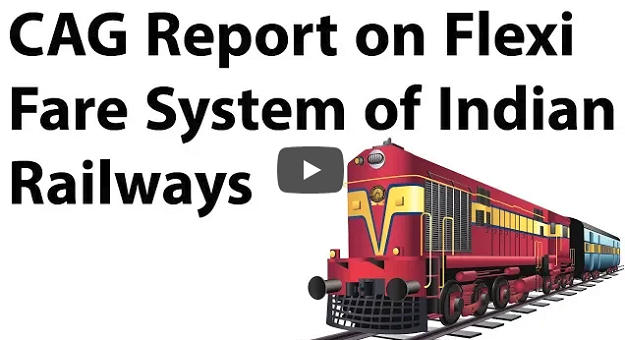Table of Contents
Cag Report On Flexi Fare System

•The base fares will increase by 10 per cent with every 10 per cent of berths sold subject to a prescribed ceiling limit
•According to the statement, other supplementary charges like reservation, superfast, catering and service tax will be levied separately.
What CAG said on flexi fare system
a strong rebuke to the railways’ flexi-fare system, the CAG (Comptroller and Auditor General of India) has warned the scheme could “force” passengers to opt for airlines, noting that the national transporter had already lost its premium train patronage to other mail and express trains.
Flexi fare system earned more for the government
•The flexi fare scheme introduced by the Railways has resulted in lower occupancy, though the government has benefited by more than Rs 550 crore, the national auditor has said as it cautioned that the scheme may force passengers to look at the option of air travel.
Flexi fares in premium trains
•The CAG study on flexi fares in Rajdhani, Shatabdi and Duronto trains has found that “post implementation of this scheme, occupancy decreased in all classes, except sleeper class in Duronto trains
Occupancy dropped
The occupancy dropped significantly, even in AC3 class (which was one of the most profitable classes), after introduction of flexi fare and the vacant berths increased from 0.6% in pre-flexiperiod to 4.5% in post-flexi period, CAG said
Earnings from flexi fare system
•Though Railways earned Rs 552 crore from passenger earnings from premier trains post flexi fare system during September 2016 to July 2017, there was degrowth of 2.7% in number of passengers, despite availability of higher number of berths/seats,”
Air fare vs Train fare
•The auditor also compared Railways’ flexi fare with air fare for different periods in 13 sectors. Its study revealed that air fares were cheaper than the respective train fares for a large number of routes.
What railway board said in its reply to CAG
•The railway board in its reply to CAG has stated that a committee has already reviewed the scheme and submitted its report in January 2018 and their recommendations are under the consideration of the ministry
•The information should also be displayed to the passenger during the booking in case the fare of lower class becomes higher than the higher class to exercise option to travel by the higher class.
•#No PremiumTatkal Quota in these trains.
•#Tatkal will be available at 150 percent of base fare.
However, no additional charges as “Tatkal charges” will be levied.
•While in air fares the prices of tickets increase with increase in demand, in flexi fare, there is a fixed increase in fares after every 10 per cent of the tickets booked irrespective of the demand.
•By paying a higher price for an air ticket, a passenger is ensured a confirmed seat, but a passenger who purchases a waitlisted train ticket by paying a higher amount does not have an assurance of confirmed ticket
•Thus, charging a higher fare without providing confirmed seat/berth would force passengers to explore other available alternatives,





















 WhatsApp
WhatsApp